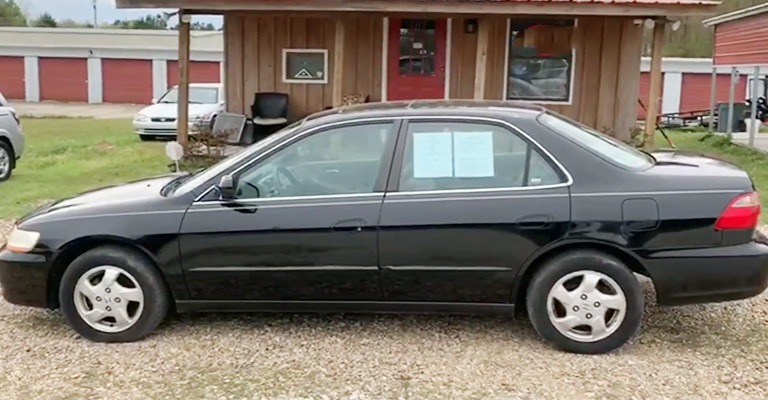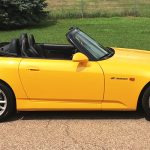The 2000 Honda Accord is a popular mid-size sedan that has been on the market for decades. However, like any car, it is not immune to problems. Some common issues that have been reported by owners of the 2000 Honda Accord include transmission problems, engine issues, and electrical issues.
Other reported problems include issues with the suspension, brakes, and air conditioning system. While some of these problems may be minor and easy to fix, others can be more serious and costly to repair.
It is important for owners of the 2000 Honda Accord to be aware of potential issues and to have their car regularly maintained to help prevent or catch problems early on.

2000 Honda Accord Problems
1. “No Start” Due to Ignition Switch Failure
This problem is caused by a failure of the ignition switch, which can prevent the car from starting. The ignition switch is responsible for sending the signal to the starter to turn the engine over and start the car.
If the ignition switch fails, the car will not start, even if all other systems are functioning properly.
2. Check Engine and D4 Lights Flashing
The check engine light is a warning light that indicates a problem with the car’s engine or emission control system. The D4 light is a transmission warning light that indicates a problem with the transmission.
If either of these lights is flashing, it could indicate a serious problem with the car that needs to be addressed as soon as possible.
3. Radio/Climate Control Display May Go Dark
This issue is caused by a failure of the display unit that shows the radio and climate control information. If the display goes dark, it can be difficult or impossible to see the radio or climate control settings, making it difficult to use these functions.
4. Faulty Door Lock Actuator May Cause Power Door Locks to Activate Intermittently
The door lock actuator is responsible for activating the power door locks when the lock button is pressed. If the actuator is faulty, the door locks may activate erratically or not at all. This can be frustrating for drivers and may also compromise the security of the vehicle.
5. Warped Front Brake Rotors May Cause Vibration When Braking
Warped brake rotors are a common problem that can cause a vibration or pulsation when braking. This is often caused by the rotors overheating due to excessive braking or other issues, such as using the wrong type of brake pads. Warped rotors can be difficult to detect, as they may not cause any problems when driving at low speeds or when the brakes are not being applied.
However, when the brakes are applied at high speeds or under heavy load, the vibration can become noticeable. Warped rotors can be dangerous, as they can reduce the effectiveness of the brakes and increase the distance needed to stop the car.
6. Air Conditioning Blowing Warm Air
If the air conditioning in a 2000 Honda Accord is blowing warm air instead of cold, it could be due to a variety of issues. One possible cause is a failure of the compressor, which is responsible for pressurizing the refrigerant and circulating it through the air conditioning system.
Other possible causes include low refrigerant levels, a clogged expansion valve, or a faulty thermostat. If the air conditioning is blowing warm air, it is important to have it inspected and repaired as soon as possible to ensure it is functioning properly.
7. Porous Engine Block Casting May Cause Engine Oil Leaks
Porous engine block casting is a manufacturing defect that can cause engine oil to leak from the engine. This can be caused by microscopic holes or imperfections in the engine block casting that allow oil to escape.
Porous engine block casting can be difficult to detect, as it may not cause any noticeable problems until the engine oil level is significantly low. If the engine oil level is low, it is important to have the engine inspected to determine the cause and to make any necessary repairs.
8. Driver’s Door Latch Assembly May Break Internally
The door latch assembly is responsible for keeping the door closed and allowing it to be opened when the handle is pulled. If the latch assembly breaks internally, it can cause the door to become stuck in the closed position or to open unexpectedly.
This can be a serious safety issue, as it can prevent the driver or passengers from being able to exit the car in an emergency. It can also make it difficult or impossible to open the door normally.
9. Bad Engine Mounts May Cause Vibration, Roughness, and Rattle
The engine mounts are responsible for securing the engine to the frame of the car. If the engine mounts are worn out or damaged, it can cause the engine to vibrate or move around excessively.
This can cause a variety of problems, including a rough or rough idle, a rattle or noise when driving, and vibration in the steering wheel or pedals. Bad engine mounts can also cause wear and damage to other parts of the car, such as the transmission and exhaust system.
10. Problems Shifting Into 3rd Gear
If a 2000 Honda Accord is having problems shifting into 3rd gear, it could be due to a variety of issues. One possible cause is a failure of the transmission itself, which could be due to wear, damage, or a lack of lubrication.
Other possible causes include a faulty shift cable or linkage, or a problem with the transmission control module. If the car is having difficulty shifting into 3rd gear, it is important to have it inspected and repaired as soon as possible to prevent further damage to the transmission.
11. Clock Light May Burn Out
The clock light is responsible for illuminating the clock display on the dashboard. If the clock light burns out, it can be difficult or impossible to see the time, especially at night or in low light conditions.
The clock light is typically a small bulb that can be replaced relatively easily, but it is important to use the correct type of bulb to ensure it functions properly.
12. Leaking Gaskets May Allow Water into Tail Light Assembly
Gaskets are seals that are used to prevent fluids or gases from leaking out of or into a system. If a gasket fails and allows water to enter the tail light assembly, it can cause the tail lights to malfunction or fail entirely.
This can be a serious safety issue, as it can reduce the visibility of the car to other drivers and increase the risk of a collision. If the tail lights are not functioning properly, it is important to have the gasket repaired or replaced to prevent further damage.
13. Check Engine Light for Running Rough and Difficulty Starting
If the check engine light is on and the car is running rough or having difficulty starting, it could be due to a variety of issues. One possible cause is a problem with the ignition system, such as a faulty spark plug or ignition coil.
Other possible causes include a malfunctioning fuel system, a faulty oxygen sensor, or a problem with the engine itself. If the check engine light is on and the car is running rough, it is important to have it inspected and repaired as soon as possible to prevent further damage.
14. Check Engine Light Due to Failed Air Fuel Sensor or Oxygen Sensor
The air fuel sensor and oxygen sensor are both critical components of the car’s emission control system. They are responsible for monitoring the air-fuel ratio and the oxygen content in the exhaust gas, respectively.
If either of these sensors fails, it can cause the check engine light to come on and potentially affect the performance of the car.
If the check engine light is on due to a failed air fuel sensor or oxygen sensor, it is important to have the sensor replaced as soon as possible to restore the proper functioning of the emission control system.
15. Plugged Moon Roof Drains May Cause Water Leak
The moon roof, or sunroof, is a feature that allows drivers and passengers to open a window in the roof of the car to let in air and light. The moon roof is equipped with drains to allow water to drain out when it rains or when the moon roof is open.
If the drains become clogged, it can cause water to leak into the car, potentially damaging the interior and causing problems with the electrical system.
If the moon roof is leaking water, it is important to have the drains cleared or replaced to prevent further damage.
Possible Solution
| Problem | Possible Solution |
| No Start Due to Ignition Switch Failure | Replace the ignition switch |
| Check Engine and D4 Lights Flashing | Diagnose and repair the issue causing the warning lights to come on |
| Radio/Climate Control Display May Go Dark | Replace the display unit |
| Faulty Door Lock Actuator May Cause Power Door Locks to Activate Intermittently | Replace the door lock actuator |
| Warped Front Brake Rotors May Cause Vibration When Braking | Replace the front brake rotors |
| Air Conditioning Blowing Warm Air | Repair or replace the faulty component causing the issue (e.g. compressor, thermostat) |
| Porous Engine Block Casting May Cause Engine Oil Leaks | Repair or replace the engine block |
| Driver’s Door Latch Assembly May Break Internally | Replace the door latch assembly |
| Bad Engine Mounts May Cause Vibration, Roughness, and Rattle | Replace the engine mounts |
| Problems Shifting Into 3rd Gear | Repair or replace the faulty component causing the issue (e.g. transmission, shift cable) |
| Clock Light May Burn Out | Replace the clock light bulb |
| Leaking Gaskets May Allow Water into Tail Light Assembly | Repair or replace the faulty gasket |
| Check Engine Light for Running Rough and Difficulty Starting | Diagnose and repair the issue causing the check engine light to come on |
| Check Engine Light Due to Failed Air Fuel Sensor or Oxygen Sensor | Replace the failed sensor |
| Plugged Moon Roof Drains May Cause Water Leak | Clear or replace the moon roof drains |
2000 Honda Accord Recalls
| Recall Number | Issue | Date | Models Affected |
| 20V026000 | Driver’s Frontal Air Bag Inflator Ruptures During Deployment Spraying Metal Fragments | Jan 21, 2020 | 11 |
| 20V027000 | Driver’s Frontal Air Bag Inflator Ruptures During Deployment Spraying Metal Fragments | Jan 21, 2020 | 8 |
| 02V080000 | Air Bag Inflator Malfunction | Mar 26, 2002 | 2 |
| 02V051000 | Defective Seat Belt Buckles | Feb 14, 2002 | 2 |
| 01V380000 | Defective Seat Belt Buckles | Jan 2, 2002 | 2 |
| 05V025000 | Ignition Switch Interlock Failure | Jan 31, 2005 | 3 |
| 04V256000 | Failed Dimmer Control | Jun 8, 2004 | 1 |
| 00V184000 | Improper Welding on Rear Suspension Lower Arms | Jul 20, 2000 | 1 |
Recall 20V026000 and 20V027000:
These recalls were issued due to a problem with the driver’s frontal air bag inflator, which can rupture during deployment and spray metal fragments. This can increase the risk of injury or death to the driver or other occupants in the event of a crash. The recalls affected a total of 19 models of the 2000 Honda Accord.
Recall 02V080000:
This recall was issued due to a malfunction of the air bag inflator in certain 2000 Honda Accord and Acura TL models. If the air bag does not deploy correctly in a crash, it can increase the risk of injury to the front seat passenger.
Recall 02V051000 and 01V380000:
These recalls were issued due to a defect in the seat belt buckles in certain 2000 Honda Accord sedans and coupes. If the seat belts fail to release properly after a crash, it can make it difficult for the owner to exit the car, increasing the risk of injury.
Recall 05V025000:
This recall was issued due to a problem with the ignition switch interlock in certain 1997-2002 Honda vehicles, including the 2000 Honda Accord. If the driver does not shift the car to park and engage the parking brake before removing the key, the car could roll and potentially cause a crash.
Recall 04V256000:
This recall was issued due to a failure of the dimmer control in certain 2000 Honda Accord passenger vehicles. If the dimmer control fails, the instrument lights may not work, making it difficult for the driver to see the gauges at night.
Recall 00V184000:
This recall was issued due to improper welding on the rear suspension lower arms of certain 2000 Honda Accord vehicles. This can reduce the handling and control of the car, increasing the risk of a crash.
Problems and Complaints Sources
https://repairpal.com/2000-honda-accord/problems
All Honda Accord years we talked –




